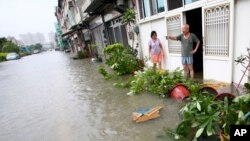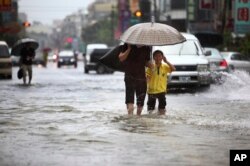Taiwan's government has apologized three times over deadly floods since August 23 and doubled up restoration work to try to stop storm damage from becoming an issue in pivotal elections this year.
Results of mid-term local elections such as ones set for November, often foreshadow the results of Taiwan presidential races two years later. The president, responsible for foreign affairs, has had thorny relations with China. Now flood control could be an issue also.
Storms that began with a tropical depression dumped up to 1,000 millimeters of rain in parts of south-central Taiwan in the days after, killing seven people. Some citizens in the flood zones have asked why floods could become so severe despite billions of Taiwan dollars spent on prevention.
Premier William Lai apologized over the floods August 25, 29 and 30. His government has vowed to pump the water out of a village under 70 centimeters of flood rain and clean up dead livestock that might otherwise spread disease. Households damaged by floodwaters will get NT$20,000 ($651), the government pledged last month.
Government officials have fretted over disaster responses at least since former president Ma Ying-jeou faced criticism over perception that he did too little, too late after Typhoon Morakot in 2009 set off landslides that killed about 700 people. Ma, who pushed for closer China ties, left office in 2016. His successor Tsai Ing-wen advocates a more guarded approach toward relations with Beijing.
“Natural disasters truly do influence the voting behavior of the people,” said Ku Chung-hwa, a retired sociology professor and standing board member with the Taiwan advocacy group Citizens’ Congress Watch.
This year, he said, “for the party in power there will be some damage, but the degree of impact perhaps won’t be too big.”
Epic floods
Storms since August 23, tapering off only last week, wiped out livestock, including 1.56 million chickens and caused $21.34 million in economic damage in the first five days, official documents and local media say. Those reports say about 100 people were hurt and 6,000 evacuated.
The heaviest losses hit Chiayi County and the cities of Tainan and Kaohsiung.
Since Typhoon Morakot and a 1999 earthquake that killed 2,400 people, Taiwan leaders have pounced on natural disasters to show the government is helping to its fullest, analysts say.
People regularly evaluate officials on matters of health and safety, said Joanna Lei, chief executive officer of the Chunghua 21st Century think tank in Taiwan
They’re upset now, according to local media reports, about the effectiveness of government flood control funding. The government has earmarked NT$187.3 billion especially for flood control from 2006 through the first installment of a program due to run through 2024.
“I believe this time Taiwan and Kaohsiung will have a lot of sort of soul searching,” Lei said, referring to two southern cities hit by the floods. “People in Tainan and Kaohsiung will search their souls in terms of what they have been told and what they are now experiencing.”
Leaders now mobilize disaster relief as soon as storms are forecast and offer relief months or years after a disaster passes. Tsai personally pledged a $34,800 donation for victims of a February 6 earthquake that killed 17 in eastern Taiwan.
Disasters with a heavy death toll tend to soil the reputations of leaders the most, Ku said. If handled right, he added, a disaster can even boost a party’s image.
“We need to observe this most recent (disaster),” he said. “This time the main thing is property loss and the government came out with immediate subsidies.”
November Elections
The latest storms came three months before Taiwan-wide city and council elections. The party that wins the most seats in mid-term local races gets a boost in exposure that can help its bid in the presidential race two years later.
The ruling Democratic Progressive Party’s local election sweep in 2014, for example, foreshadowed its win in the 2016 presidential race.
The party takes a cautious view on Taiwan’s best known issue abroad, its touchy relations with China. China sees Taiwan as a breakaway part of its territory and vows eventually to unite the two sides. The main opposition party advocates more engagement with Beijing.
On Thursday a series of officials told a news conference that a special task force would keep up restoration work. The sheer amount of rain made flood control difficult despite money spent to date, one added.
The premier told a cabinet meeting Thursday that traditional flood control methods have limitations.
“We can see that in two days the accumulated rainfall, whether in Chiayi, Tainan or Kaohisung, it was higher than the same during Typhoon Morakot,” Water Resources Agency Director-General Lai Chien-hsin told the news conference.





